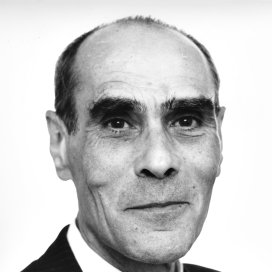Bornin LyononAugust4 1927, Jean Yoyotte beganlearning Egyptologyattheage of 14 first at the École du Louvre, then at the École pratique des hautes études (EPHE). In 1943-1944, he took part in the recording of excavation records for Pr Pierre Montet's missionto the Tanis site in the eastern Egyptian Delta, along with another young enthusiast, Serge Sauneron, future director of the Institut français d'archéologie orientale (Ifao) in Cairo. In 1948, he joined the CNRS as an intern, working with Professor Montet in the Cabinet d'égyptologie (now the Bibliothèque d'égyptologie) at the Collège de France. After graduating in history from the EPHE, he was appointed scientific member of the Ifao from 1952 to 1957. Between 1957 and 1964, he returned to the CNRS as a research fellow, then as a senior research fellow. In 1964, he was elected director of studies at the Religion of Ancient Egyptchair(Ve section des sciences religieuses) at the EPHE, where for almost thirty years he taught a wide range of Egyptological subjects. In 1964, he also founded the Mission française des fouilles de Tanis (MFFT), directing its excavation campaigns until 1985. OnOctober 5 1991, Jean Yoyotte was appointed Professor at the Collège de France. Until his retirement in 1997, he held the Egyptology chair, succeeding Professor Jean Leclant, with a program focused on late Egypt.
In some sixty years devoted to Egyptological research and teaching, with almost three hundred contributions, Jean Yoyotte has shed light on various little-known or ignored aspects of ancient Egyptian history and religion. A historian and philologist of multiple curiosities, his work covers various fields of Egyptology, from toponymy, prosopography and anthroponymy to institutions, royal ideology and religious conceptions. The main themes of his research, however, remain the " religious geography " and the history of Egypt in the first millennium BC, more specifically in the Third Intermediate Period (1069-664 BC). Among his many publications in these fields are his seminal articles, " Études géographiques " (vols. 13-15 of the Revue d'égyptologie, 1961-1963), "Les principautés du Delta au temps de l'anarchie libyenne. Étude d'histoire politique" (Mélanges Maspero I/4, 1961) and " Processions géographiques mentionnant le Fayoum et ses localités " (Bulletin de l'Ifao 61, 1962). Egypt's foreign relations and its contacts with other cultures, notably Greek, Persian and African, were also at the heart of his interests.
In the field, Jean Yoyotte's work at Tanis (1964-1985) considerably renewed the historical and archaeological issues surrounding this major site in Egypt in the first millennium BC. The results of his Tanis research and his extensive knowledge of the site's material led him to co-direct the famous exhibition Tanis. L'Or des pharaons, presented in 1987 at the Grand Palais in Paris.
In addition to his considerable scientific contribution to the discipline, Jean Yoyotte also played an essential role in promoting and making available Egyptological documentary collections. From 1964 onwards, he reorganized and developed the Centre de documentation égyptologique de l'EPHE, which became the Centre Wladimir Golenischeff, and today includes his scientific archives (accessible at theHumathèque Condorcet and partly online on the PSLdigital library ). At the Collège de France, his imprint is also omnipresent in the holdings of the library and archives of Egyptology, through his various contributions to the inventory and classification of the collections.
Jean Yoyotte passed away onJuly1 2009, shortly before his 82ndbirthday .

